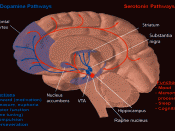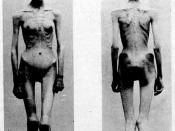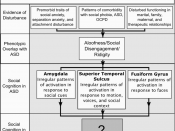Anorexia Nervosa is an eating disorder in which a person refuses to eat for fear of weight gain. An anorexic may appear to not have an appetite, even though signs of hunger are there, the anorexic won't respond to them. The "loss of appetite" is due to emotional states such as anxiety, irritation, anger, and fear. An average case of this disease is of a young woman who is obsessed with the idea of being thin and restricts her food intake to the point of danger; she may alternate fasting with periods of binging (bulimia). Some symptoms of the disease are: intense fear of becoming obese that does not diminish as weight loss progresses, disturbance of body image, such as claiming to feel fat even when emaciated, refusal to maintain body weight over a minimal normal weight for age and height, self-induced vomiting or use of laxatives and/or extensive exercise.
Anorexia is thought to be a psychological disorder and often occurs as the result of emotional problems. Some factors that contribute to the disease are: fear of growing up, fear of sexuality, rejection of one's body, a dysfunctional family system with a controlling mother, and an uninvolved father, excessive pressure for thinness, also, nervous system abnormalities or metabolic changes. The anorexic is usually described as the "perfect" child. They are often popular, obedient, respectful, and are often good students. Parents of anorexics can be very domineering, or have unreasonable expectations of their child. This may leave the child feeling that the only area they have any control over in their life is their diet. In general, an anorexic usually has low self-esteem, which is usually the main cause of the disorder.
Some effects of anorexia are: the breaking down of muscle tissue for energy, lowered levels of heart rate, BMR, and body temperature, also, loss of muscle tissue can cause permanent heart damage. Treatment of anorexia requires a team of professionals: physicians, nurses, psychiatrists, family psychologists, and dietitians working together. Anorexia is curable, however, it can be terminal if not treated. As many as 10 percent of anorexics die of starvation. Early treatment is essential to prevent permanent damage to one's health. Treatment may sometimes involve forced feeding temporarily to accomplish the first priority of meeting nutritional deficiencies to prevent long-term medical problems.


